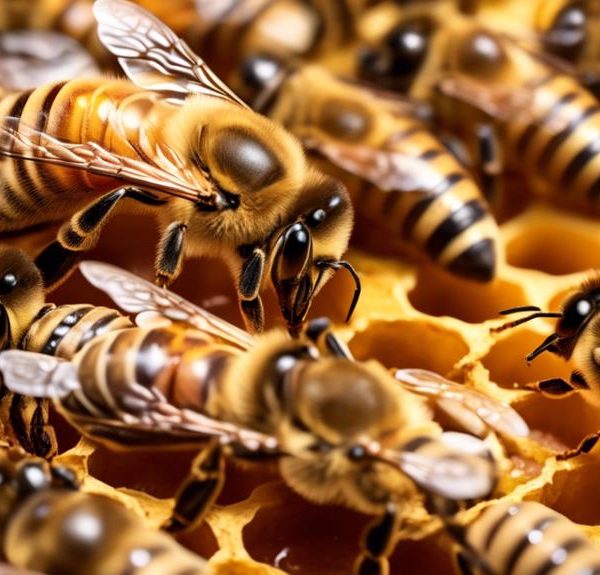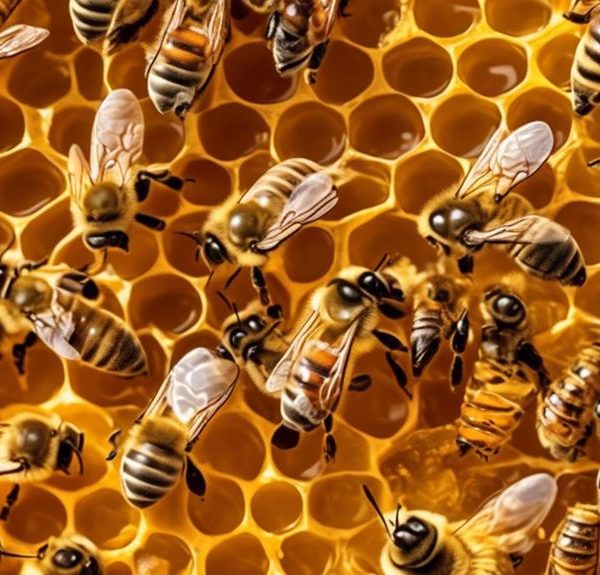Journey into the fascinating world of bees, understand their critical role in our survival, and how we can prevent their alarming disappearance.
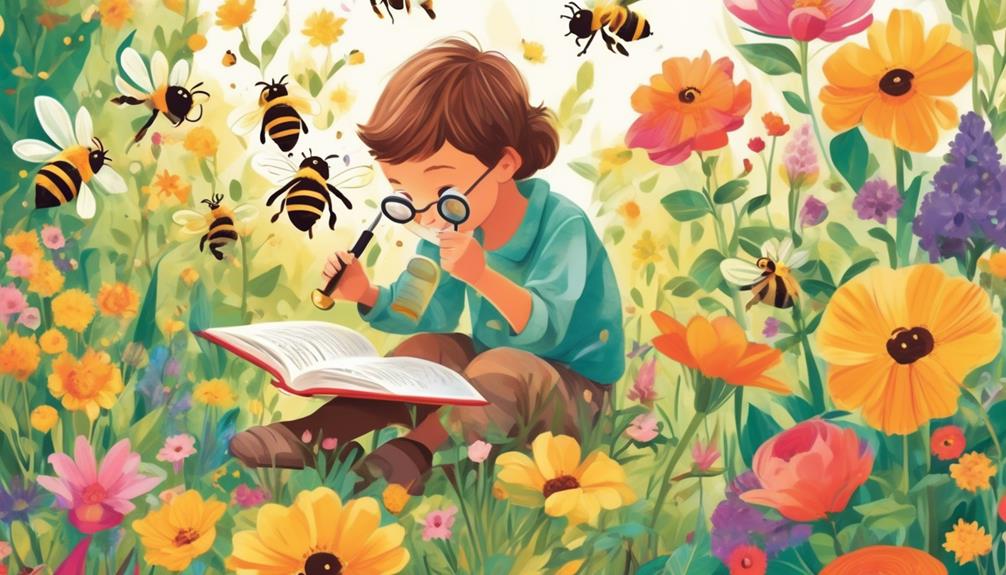
Why Do We Need Bees Usborne?
Let's tiptoe around the topic and say bees are not just another cog in the wheel of our ecosystem; they're crucial to our survival. You might not realize it, but bees play an instrumental role in our food supply, by pollinating a significant portion of the crops we eat daily.
But what if these buzzing creatures were to disappear? What consequences would we face, and more importantly, how can we prevent such a daunting scenario?
Stick around, there's much to uncover in the remarkable world of bees.
Key Takeaways
- Bees are crucial for pollination, enabling plants to produce fruit and seeds, and increasing genetic diversity.
- Bees play a vital role in maintaining biodiversity and the health of the planet by pollinating plants that support other wildlife.
- Bee populations are facing threats such as habitat loss, pesticides, diseases, and climate change, leading to their decline.
- The decline in bee populations jeopardizes food variety, the stability of the agricultural sector, and the overall resilience of ecosystems.
Understanding the Role of Bees
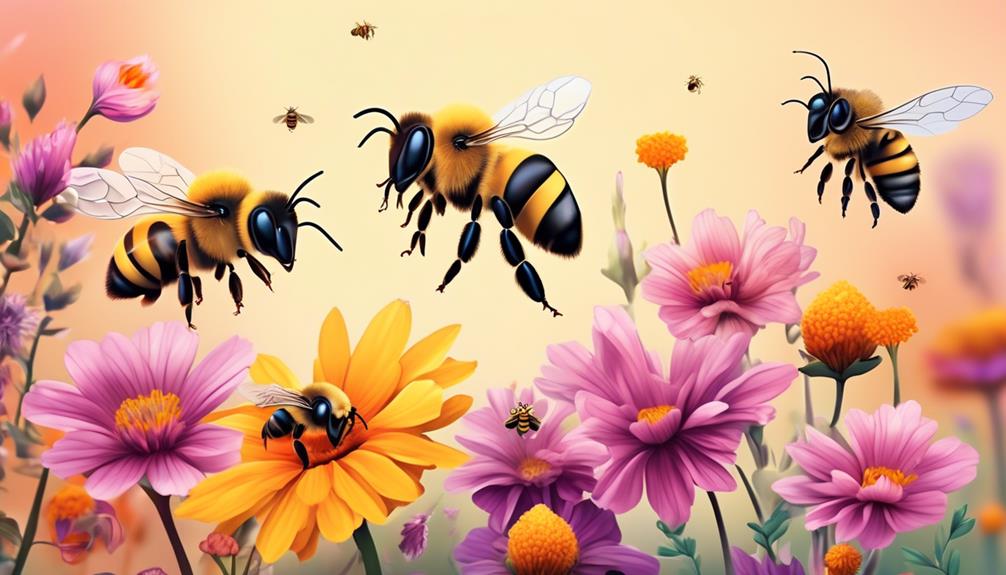
To truly grasp the importance of bees, you'll need to delve into their fascinating roles in the ecosystem, starting with their primary duty as efficient pollinators. You see, when bees visit flowers for nectar, they inadvertently collect pollen on their bodies. As they flit from flower to flower, they redistribute this pollen, enabling plants to cross-fertilize and produce fruit and seeds.
But that's not all. Bees aren't just general pollinators; they're specialists in what they do. Different bee species are adapted to pollinate specific types of plants, increasing the genetic diversity of our flora. This biodiversity is key to ecosystem resilience, which in turn supports our survival.
Moreover, bees' pollination services aren't just crucial for wild plants. Many of our agricultural crops rely on bees too. Without them, our food variety would drastically shrink, impacting not only our diet but also our economy.
Bees in the Ecosystem
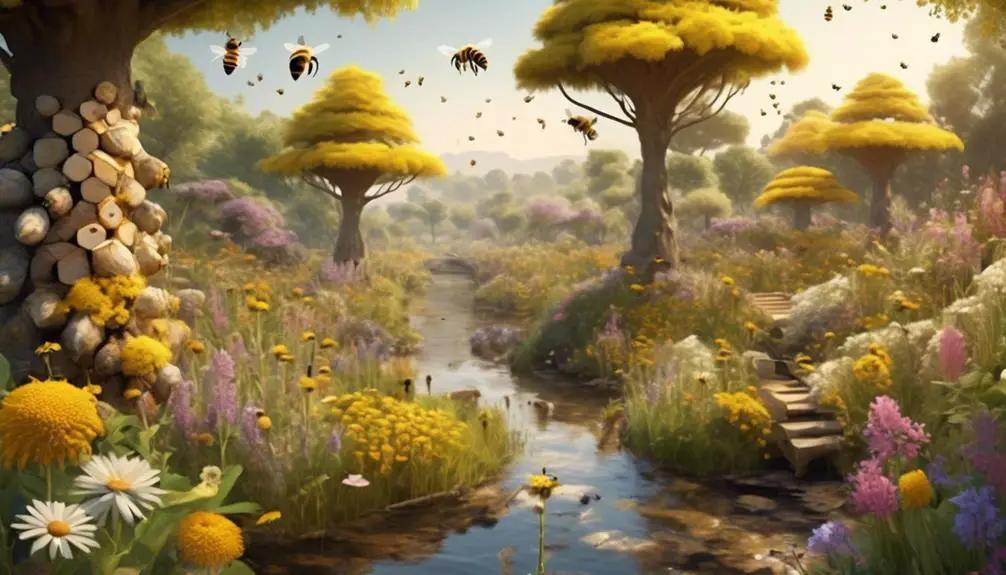
So, how exactly do bees fit into the ecosystem?
You may be surprised to learn that bees play a crucial role that extends far beyond making honey. These industrious insects are vital pollinators, transferring pollen and seeds from one flower to another, fertilizing the plant so it can grow and produce food. Without bees, many of our favorite fruits, vegetables, and nuts would become significantly less abundant and more expensive.
But it's not just about food, you see. Bees also play a pivotal role in pollinating plants that make up the world's habitats for other wildlife. They're like the tiny gardeners of our ecosystem, diligently working to maintain biodiversity and the health of our planet.
Moreover, bees contribute to complex, interconnected ecosystems that allow a diverse number of different species to co-exist. In short, without bees, our landscapes would be vastly different and far less colorful and diverse.
Bees are a critical component of our ecosystem, and their decline could have devastating effects on us and the planet. So, let's value these little workers for the monumental job they do. We truly can't afford to lose them.
Threats to Bee Populations
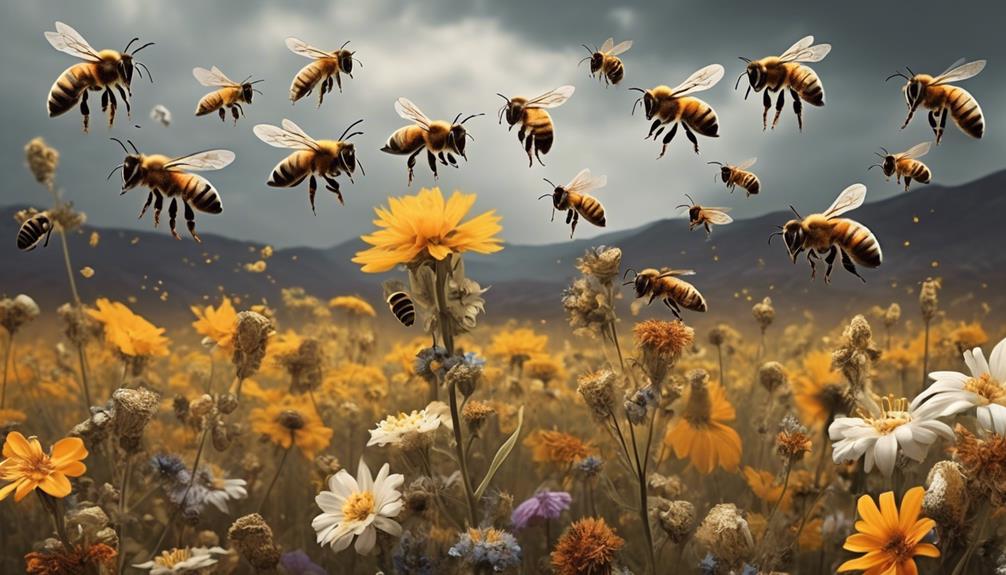
Despite the irreplaceable role bees play in our ecosystem, they're facing a multitude of threats that could significantly dwindle their populations.
You should know that habitat loss is a major threat to bees. As humans continue to expand cities and agriculture, natural landscapes where bees thrive are disappearing. Without these vital habitats, bees struggle to find food and nesting sites, which can lead to population declines.
Pesticides are another significant threat. They're designed to kill pests, but often harm bees as well. Pesticides can poison bees directly or contaminate their food sources, leading to a weakened immune system and increased vulnerability to disease.
Speaking of disease, bees are susceptible to a variety of illnesses and parasitic mites. Diseases like Colony Collapse Disorder (CCD) cause worker bees to abandon their hives, leading to a rapid decline in bee populations.
Lastly, climate change also poses a threat. Changes in weather patterns and temperatures can disrupt the timing of flower blooming, which bees rely on for food. This mismatch can result in bees emerging before flowers have bloomed, leading to starvation.
Impact of Bees on Agriculture
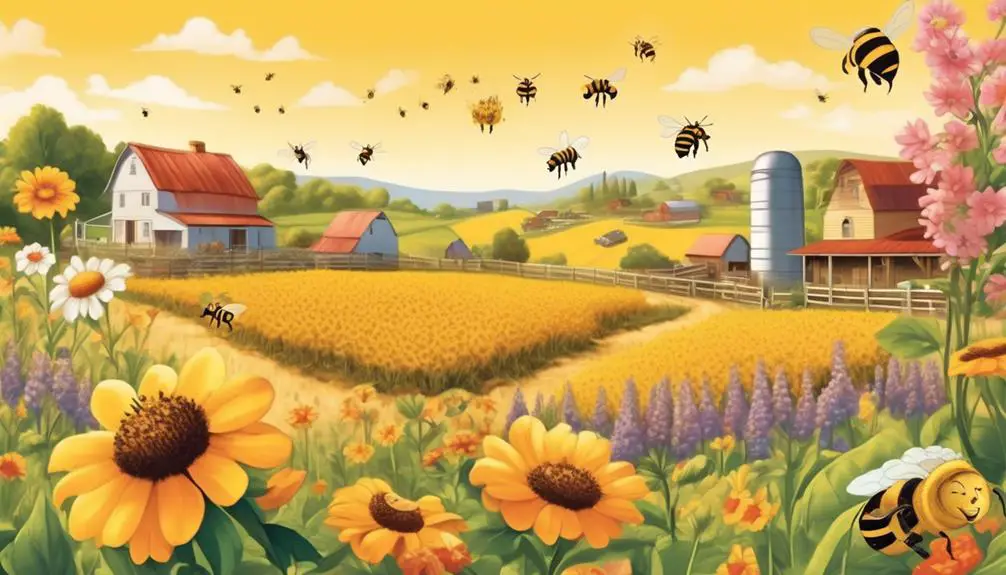
While you may not realize it, bees play a crucial role in agriculture, serving as pollinators for a wide range of crops. From apples to almonds, bees' diligent pollination efforts enhance the quality and yield of these crops, significantly boosting the global economy.
You'd be surprised that nearly one-third of the food you consume relies on pollination, primarily by bees. They're the unsung heroes of the agricultural sector. Without them, our plates would look quite different, and not in a good way.
The economic value of bee pollination is staggering. It's estimated that honey bees contribute over $15 billion to the US agricultural economy annually. Moreover, the indirect impact of bee pollination, which includes enhancing the productivity of other crops and the dairy and beef industries (by pollinating clover and alfalfa), adds another $9 billion.
Unfortunately, bees' population decline threatens this system. Without adequate measures to protect and promote the health of bee populations, we're risking not just the variety of our diets but also the stability of the agricultural sector.
Therefore, understanding, appreciating, and safeguarding bees isn't just an ecological imperative but an economic necessity.
Conservation Efforts for Bees

Given the vital role bees play in agriculture and the economy, numerous conservation efforts are being undertaken to protect these industrious pollinators and ensure their survival. You'll find that these endeavors are multifaceted, targeting different issues such as habitat loss, pesticides, and disease.
For starters, organizations and individuals alike are creating bee-friendly habitats. You can do your part by planting native flowers, providing clean water sources, and avoiding harmful pesticides in your garden. Every little action contributes to a larger, more significant impact.
Another important conservation effort is the regulation of pesticides. Many chemicals used in agriculture are lethal to bees, so activists and lawmakers are pushing for stricter regulations and the promotion of organic farming. You can support this by purchasing organically grown produce whenever possible.
Lastly, research and education play a crucial role. Scientists are working tirelessly to understand more about bee diseases and how to combat them. Meanwhile, educational campaigns are spreading awareness about the importance of bees and how everyone can help. You can contribute by staying informed and sharing knowledge with others.
Frequently Asked Questions
What Are the Different Types of Bees Found Worldwide?"
You're asking about the different types of bees worldwide. Well, there's quite a variety! You've got honeybees, bumblebees, and carpenter bees to name a few.
Then there's the lesser-known ones like mason bees, leafcutter bees, and sweat bees. And let's not forget the solitary bees and social bees.
Each type plays a unique role in pollination, making them all essential for a healthy ecosystem. It's fascinating, isn't it?
How Does a Bee Hive Operate and What Are the Roles of Different Bees Within the Hive?"
You're curious about bee hive operations and the roles of different bees.
In a hive, you've got three types: the queen, workers, and drones.
The queen, she's in charge of laying eggs.
Worker bees, they're the females who do most tasks like collecting food, cleaning, and even defending the hive.
Drones, they're the males whose primary role is to mate with the queen.
It's a well-oiled machine where each bee has its own job.
What Is the Lifespan of Different Types of Bees?"
You're curious about the lifespan of different types of bees. Worker bees, the most common type, usually live for 5-6 weeks.
Queen bees, on the other hand, can live up to 5 years.
Drone bees, or males, have the shortest lifespan, typically only living a few weeks.
It's interesting to note that the lifespan of a bee can vary greatly depending on its role in the hive and the time of year it's born.
How Do Bees Communicate With Each Other Within a Hive?"
Bees communicate within a hive through a 'waggle dance'. It's a complex set of movements that convey the location of food sources. When a bee returns to the hive, it'll perform this dance to tell others where to find nectar.
The bee's direction, duration, and speed of the dance all play a part in this communication method.
It's fascinating that these tiny creatures have such an intricate way of sharing information!
What Are the Medicinal Benefits of Honey and Other Bee Products?"
You're probably aware that honey's a natural sweetener, but did you know it's also packed with antioxidants? It's true! It can soothe a sore throat too.
Propolis, another bee product, has antimicrobial properties.
Ever heard of bee pollen? It's a superfood! It boosts your immune system and improves your energy.
And let's not forget royal jelly, it's believed to have anti-aging benefits.
Conclusion
So, you see, bees are vital to our ecosystem and economy. Without them, our food supply would dwindle dramatically. Yet, they're under threat from various factors, demanding urgent action.
We should all take part in conservation efforts to protect these industrious little creatures. In essence, we need bees just as much as they need us. Let's cherish them, protect them, and appreciate the crucial role they play in our world.

